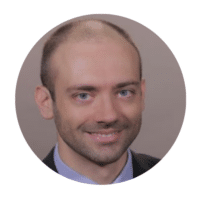Researcher Spotlight: Lorenzo Falchi, MD
MEMORIAL SLOAN KETTERING CANCER CENTER

For the last two decades, follicular lymphoma (FL) has been treated with traditional chemotherapy. While effective, this treatment is not considered curative and can cause a host of short- and long-term side effects. Immunotherapy with bispecific antibodies, which bring lymphoma cells into close contact with tumor-killing immune cells, has the potential to revolutionize FL treatment. The bispecific antibody mosunetuzumab has shown promising results in the setting of pre-treated FL. Now, through his LRF research, Dr. Falchi will test the efficacy of mosunetuzumab in treatment-naïve FL. “Utilizing mosunetuzumab as the first treatment will be more beneficial than following chemotherapy because an immune system not weakened by chemo will be more beneficial than following chemotherapy because an immune system not weakened by chemo will kill lymphoma cells more efficiently,” he explains.
Dr. Falchi is an assistant attending at Memorial Sloan Kettering Cancer Center and an instructor of medicine at Weill Cornell Medical College in New York City. He first became interested in lymphoma research during his medical training at the University of Perugia in Italy, and subsequently when on to complete a leukemia fellowship at The University of Texas MD Anderson Cancer Center in Houston, Texas.
Since joining the lymphoma faculty at Memorial Sloan Kettering Cancer Center, his research has focused on developing immunotherapies for B-cell non-Hodgkin lymphoma. Over the next decade, he hopes to develop an internationally recognized lymphoma immunotherapy program made up of clinical and translational investigators as well as trainees. “I want to cultivate healthy and productive relationships with like-minded colleagues at other academic institutions to create a permanent thinktank that promotes innovative, sustainable, and impactful immunotherapy lymphoma research,” he says.


